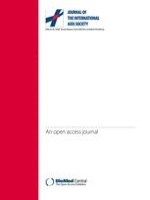Purpose of study
Adults initiating ART in low-income countries have higher mortality in the first 3 months on ART than those in high-income countries, with more similar mortality risks after 6 months. However, the specific pattern of changing mortality risk after ART has not been investigated. It is also not known whether children initiating ART are at the same high risk of early mortality as adults in resource-limited settings.
Methods
We used flexible parametric proportional hazards models to investigate how the risks of death vary over the first year on ART in adults (18+ years) from the DART trial and children (6 months-15 years) from the ARROW trial. We then estimated survival after ART initiation according to pre-ART CD4/CD4% and investigated the impact of age, sex and CD4/CD4% in multivariable models.
Results
Similar changes in early mortality were observed in both adults and children. At all CD4/CD4%, mortality risk increased from enrolment to a maximum between days 30-45, then declined rapidly to day 180, then declining more slowly throughout the rest of the first year on ART. Estimated mortality 14, 30, 90, 180 and 365 days after ART initiation is shown in Table
1Age (years) | 18+ | 18+ | 18+ | 18+ | 4-15 | 4-15 | 4-15 | 0-3 | 0-3 | 0-3 |
pre-ART CD4/CD4% | 0-49 | 50-99 | 100-149 | 150-199 | 0-49 | 50-99 | 100+ | 0-4% | 5-9% | 10%+ |
N | 1106 | 784 | 759 | 661 | 131 | 56 | 552 | 27 | 87 | 348 |
Deaths in 1st year | 103 | 36 | 23 | 17 | 14 | 2 | 7 | 2 | 4 | 9 |
Days after ART | | | | Estimated | cumulative | mortality | | | | |
14 | 0.4% | 0.1% | 0.1% | 0.1% | 0.5% | 0.1% | 0.0% | 0.4% | 0.1% | 0.1% |
30 | 1.5% | 0.6% | 0.3% | 0.3% | 1.7% | 0.5% | 0.1% | 1.5% | 0.6% | 0.3% |
90 | 4.9% | 2.1% | 1.4% | 1.1% | 5.9% | 2.3% | 0.6% | 5.2% | 2.4% | 1.3% |
180 | 7.2% | 3.4% | 2.3% | 1.8% | 8.3% | 3.5% | 1.0% | 7.4% | 3.6% | 2.0% |
365 | 9.4% | 4.5% | 3.2% | 2.5% | 10.1% | 4.5% | 1.3% | 9.1% | 4.6% | 2.6% |
Pooling data across adults and children, after adjusting for CD4/CD4% group there was no evidence of an impact of age (p=0.29) or sex (p=0.17) on mortality during the first year on ART. There was also no evidence of a difference in mortality risk between those 4+ years with CD4<50 cells/mm3 and 0-3 with CD4%<5% (p=0.68), those 4+ years with CD4 50-99 and 0-3 with CD4% 5-<10% (p=0.48) or those 4+ years with CD4 100+ and 0-3 with CD4% 10%+ (p=0.24).
Conclusions
Children do not have significantly poorer survival on ART than adults. However, children aged 4 years and over and adults with low CD4 have remarkably similar, and high, risks of mortality in the first 3 months after ART initiation compared to those with higher CD4. Children under 4 years with low CD4% are also at similar higher mortality risks.
This article is published under license to BioMed Central Ltd. This is an open access article distributed under the terms of the Creative Commons Attribution License (
http://creativecommons.org/licenses/by/2.0), which permits unrestricted use, distribution, and reproduction in any medium, provided the original work is properly cited.











